While this time of year traditionally turns many Richmonders’ attention toward the North Pole, George Nyfeler’s has been squarely on the opposite side of the globe.
The president of local land surveying firm Nyfeler Survey recently returned from a monthlong stint in Antarctica, where his company is on its second leg of a four-year job for engineering giant Parsons at the National Science Foundation’s McMurdo Station.
The subcontract follows a three-week gig that Nyfeler completed for Parsons in 2019, setting the stage for this job that will see the firm’s surveyors deployed for three- to four-month stints from October to March through early 2026.
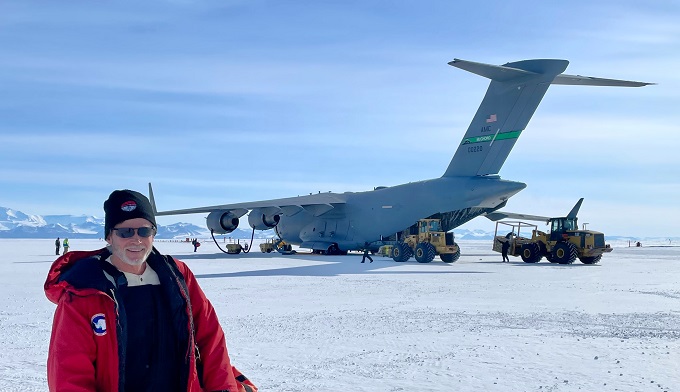
George Nyfeler arrived in October on a U.S. Air Force C-17 that also carried 38,000 pounds of concrete panels for a lodging project. (Photos courtesy George Nyfeler)
Where the initial three-week assignment asked Nyfeler to perform limited survey work for part of an IT and communication building expansion at McMurdo, this longer gig is assisting demolition and replacement of a lodging building and construction of a vehicle and operations center, the latter of which Nyfeler said will be the largest building of any kind on the ice-covered continent.
And where Nyfeler manned the initial gig solo, he was joined this year by a team that included Dugan Greenwell, the group’s survey crew chief from Alaska, and Nyfeler’s daughter, Caroline, a 2021 VCU graduate with a degree in environmental science. Caroline first joined her dad there last year, when then-Richmond-based Hunter Mitchell handled crew chief duties.
When Caroline arrived last December, Nyfeler said he was “able to say that two generations of Nyfeler surveyors are on-continent at the same time.”
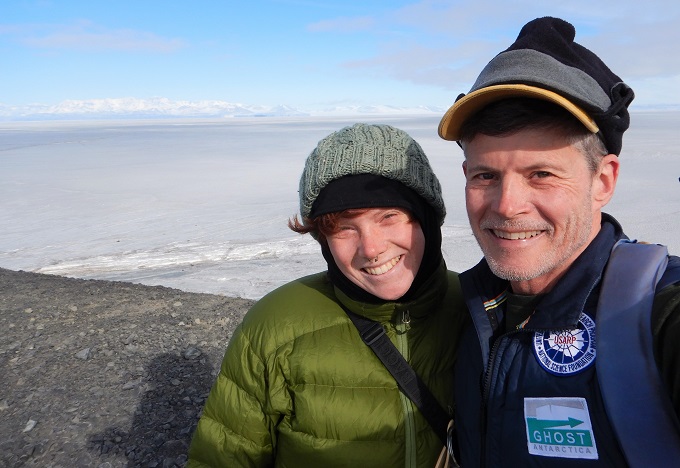
Nyfeler’s crew includes his daughter Caroline, a 2021 VCU grad with a degree in environmental science.
In emails after he had made the five-flight journey to the site on the south tip of Ross Island, Nyfeler added, “She is looking forward to meeting a few of the McMurdo Station-based scientists while here and the help that may provide her in possibly transitioning into a career field aligned with caring for the earth and its resources.”
With Caroline arriving weeks into the job as part of a shift change, and Nyfeler’s own five-week shift ending earlier that month, father and daughter had only three days on “The Ice” together during last year’s stint. They spent that time conducting surveying tasks with Mitchell, with breaks in between for what Nyfeler called their “Antarctic play time,” such as descending McMurdo’s Observation Tube through the 1-meter-thick sea ice.
The 15-foot-deep narrow pipe leads to a roughly 7-square-foot viewing room where visitors can observe beneath the ice and to the bottom of McMurdo Sound, occasionally spotting wildlife.
“I didn’t see any fish, penguins or seals swimming under there, but I did hear the pinging and singing of a couple of seals having a conversation. It was out-of-this-world cool,” Nyfeler said. “The ice in that area will break up and move out to sea in (January), as it does each year.”
Nyfeler’s free time also was spent riding a fat-tire bike to a weather station about 700 feet higher in elevation and a couple miles from McMurdo, which itself is about 700 miles from the South Pole.
Parsons, based in California, landed a contract in 2018 as the general contractor for infrastructure improvements at McMurdo, which was built more than 60 years ago. Nyfeler said McMurdo is the largest National Science Foundation outpost in Antarctica, serving as the logistics hub of the U.S. Antarctic Program and covering the equivalent of about 150 percent of the area of the continental U.S.
He said about 10,000 people inhabit roughly 50 bases and field camps established by 12 countries across the continent over the austral summer, when the sun remains in the sky and temperatures can range from 20 degrees Fahrenheit to just below zero. The number of inhabitants drops to 1,000 in the southern winters, he said.
After his six-week stint there late last year, Nyfeler put in another six weeks earlier this year before heading back for this season’s job in early October. Like last year, Caroline flew down separately and joined the crew later that month for what will be for her a 3½-month stay.
Work this season has included topographical surveys on Arrival Heights, just above McMurdo, for NASA’s Joint Polar Satellite System. The trip also involved the lodging project, parts of which were transported on the U.S. Air Force C-17 aircraft that carried Nyfeler there this time.
“I had the pleasure of spending 90 minutes, strapped into a seat in the cockpit over the Southern Ocean, swapping stories of all kind with the flight crew through their intercom headsets,” Nyfeler said. “Among our 95,000-pound load were two concrete floor panels for our lodging project, together weighing in at 38,000 pounds.”
With a fourth year added to what was originally a three-year assignment, the Antarctica gig has consumed Nyfeler in more ways than one. Earlier this year, he rebranded the company, formerly called Nyfeler Associates, to Nyfeler Survey, complete with a penguin added to the company’s logo.
The Antarctic assignment is the latest adventure for Nyfeler and Caroline, who with their family often coordinate hiking and skiing trips around his firm’s more remote jobs.
While this time of year traditionally turns many Richmonders’ attention toward the North Pole, George Nyfeler’s has been squarely on the opposite side of the globe.
The president of local land surveying firm Nyfeler Survey recently returned from a monthlong stint in Antarctica, where his company is on its second leg of a four-year job for engineering giant Parsons at the National Science Foundation’s McMurdo Station.
The subcontract follows a three-week gig that Nyfeler completed for Parsons in 2019, setting the stage for this job that will see the firm’s surveyors deployed for three- to four-month stints from October to March through early 2026.

George Nyfeler arrived in October on a U.S. Air Force C-17 that also carried 38,000 pounds of concrete panels for a lodging project. (Photos courtesy George Nyfeler)
Where the initial three-week assignment asked Nyfeler to perform limited survey work for part of an IT and communication building expansion at McMurdo, this longer gig is assisting demolition and replacement of a lodging building and construction of a vehicle and operations center, the latter of which Nyfeler said will be the largest building of any kind on the ice-covered continent.
And where Nyfeler manned the initial gig solo, he was joined this year by a team that included Dugan Greenwell, the group’s survey crew chief from Alaska, and Nyfeler’s daughter, Caroline, a 2021 VCU graduate with a degree in environmental science. Caroline first joined her dad there last year, when then-Richmond-based Hunter Mitchell handled crew chief duties.
When Caroline arrived last December, Nyfeler said he was “able to say that two generations of Nyfeler surveyors are on-continent at the same time.”

Nyfeler’s crew includes his daughter Caroline, a 2021 VCU grad with a degree in environmental science.
In emails after he had made the five-flight journey to the site on the south tip of Ross Island, Nyfeler added, “She is looking forward to meeting a few of the McMurdo Station-based scientists while here and the help that may provide her in possibly transitioning into a career field aligned with caring for the earth and its resources.”
With Caroline arriving weeks into the job as part of a shift change, and Nyfeler’s own five-week shift ending earlier that month, father and daughter had only three days on “The Ice” together during last year’s stint. They spent that time conducting surveying tasks with Mitchell, with breaks in between for what Nyfeler called their “Antarctic play time,” such as descending McMurdo’s Observation Tube through the 1-meter-thick sea ice.
The 15-foot-deep narrow pipe leads to a roughly 7-square-foot viewing room where visitors can observe beneath the ice and to the bottom of McMurdo Sound, occasionally spotting wildlife.
“I didn’t see any fish, penguins or seals swimming under there, but I did hear the pinging and singing of a couple of seals having a conversation. It was out-of-this-world cool,” Nyfeler said. “The ice in that area will break up and move out to sea in (January), as it does each year.”
Nyfeler’s free time also was spent riding a fat-tire bike to a weather station about 700 feet higher in elevation and a couple miles from McMurdo, which itself is about 700 miles from the South Pole.
Parsons, based in California, landed a contract in 2018 as the general contractor for infrastructure improvements at McMurdo, which was built more than 60 years ago. Nyfeler said McMurdo is the largest National Science Foundation outpost in Antarctica, serving as the logistics hub of the U.S. Antarctic Program and covering the equivalent of about 150 percent of the area of the continental U.S.
He said about 10,000 people inhabit roughly 50 bases and field camps established by 12 countries across the continent over the austral summer, when the sun remains in the sky and temperatures can range from 20 degrees Fahrenheit to just below zero. The number of inhabitants drops to 1,000 in the southern winters, he said.
After his six-week stint there late last year, Nyfeler put in another six weeks earlier this year before heading back for this season’s job in early October. Like last year, Caroline flew down separately and joined the crew later that month for what will be for her a 3½-month stay.
Work this season has included topographical surveys on Arrival Heights, just above McMurdo, for NASA’s Joint Polar Satellite System. The trip also involved the lodging project, parts of which were transported on the U.S. Air Force C-17 aircraft that carried Nyfeler there this time.
“I had the pleasure of spending 90 minutes, strapped into a seat in the cockpit over the Southern Ocean, swapping stories of all kind with the flight crew through their intercom headsets,” Nyfeler said. “Among our 95,000-pound load were two concrete floor panels for our lodging project, together weighing in at 38,000 pounds.”
With a fourth year added to what was originally a three-year assignment, the Antarctica gig has consumed Nyfeler in more ways than one. Earlier this year, he rebranded the company, formerly called Nyfeler Associates, to Nyfeler Survey, complete with a penguin added to the company’s logo.
The Antarctic assignment is the latest adventure for Nyfeler and Caroline, who with their family often coordinate hiking and skiing trips around his firm’s more remote jobs.

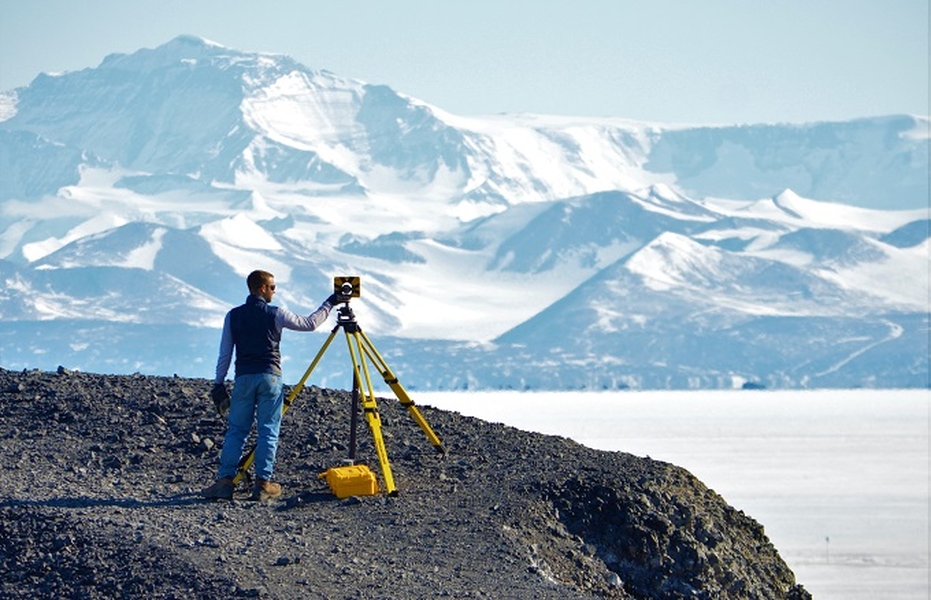
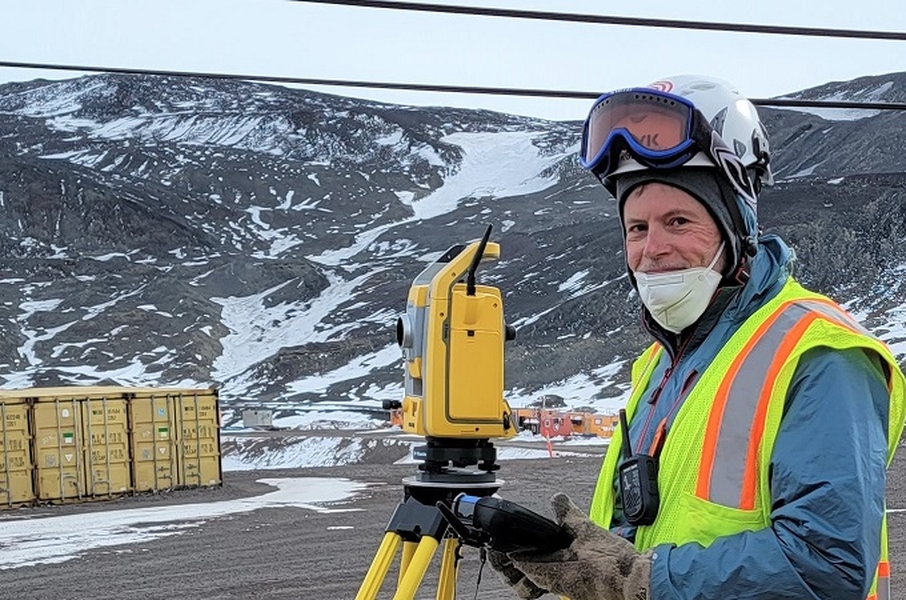
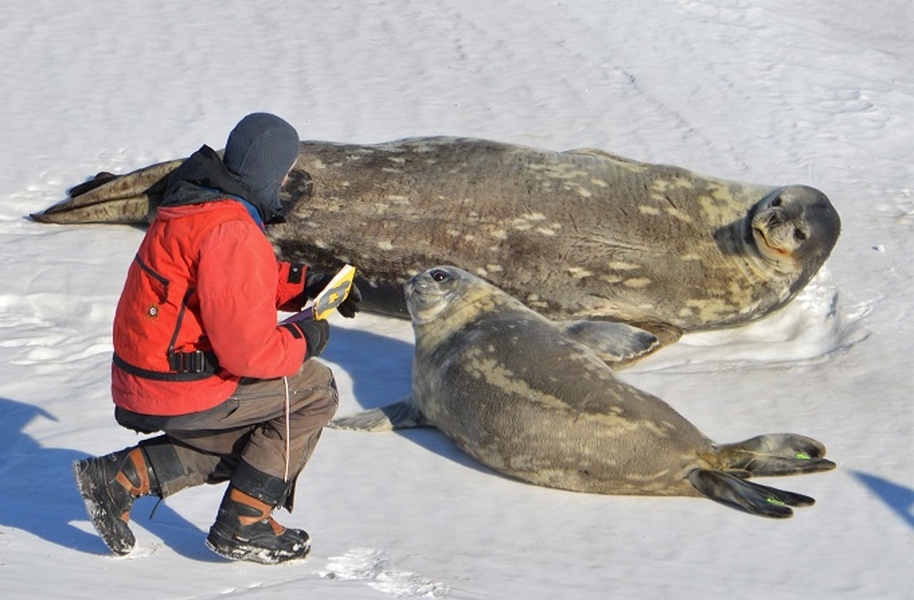
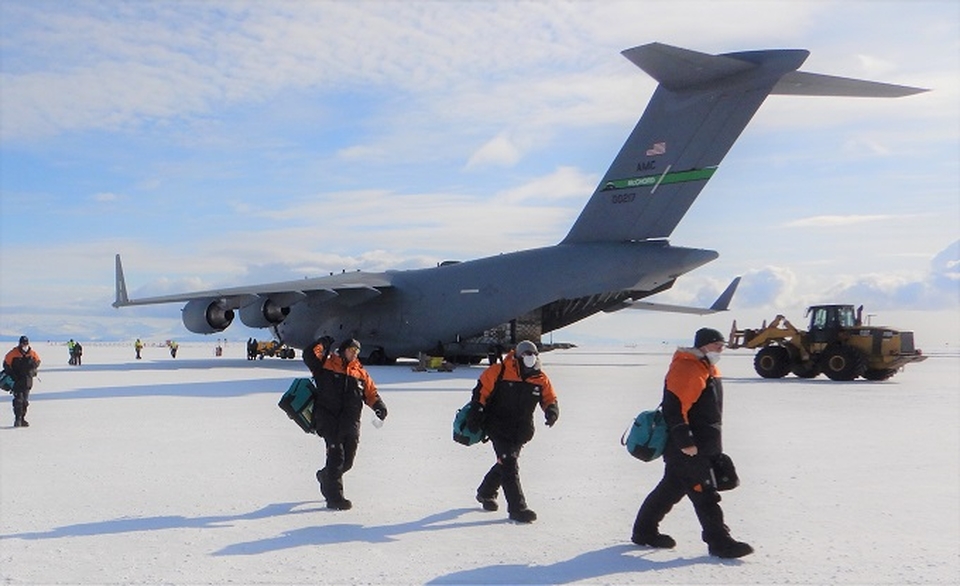
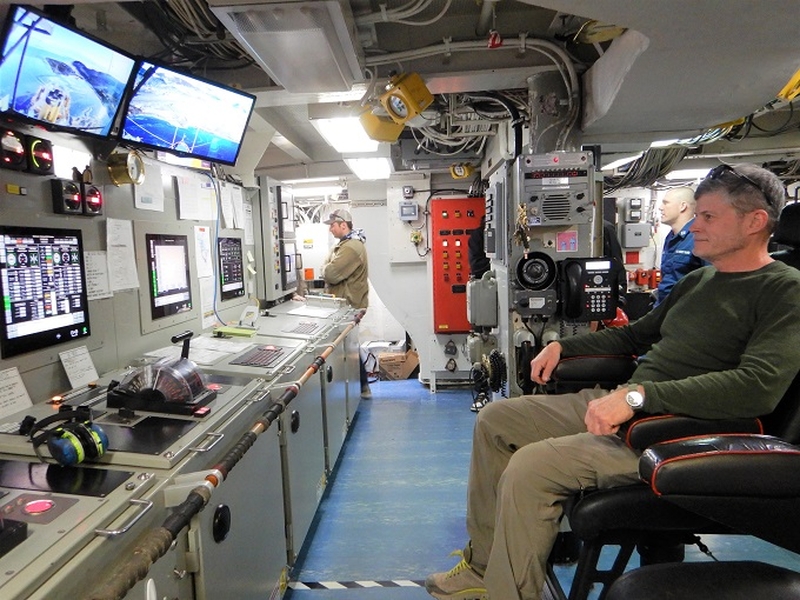
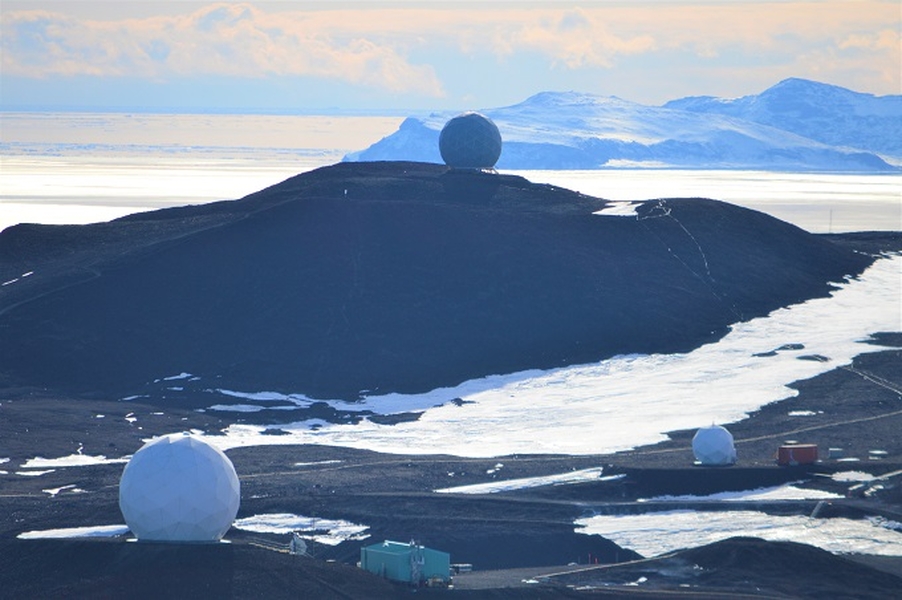
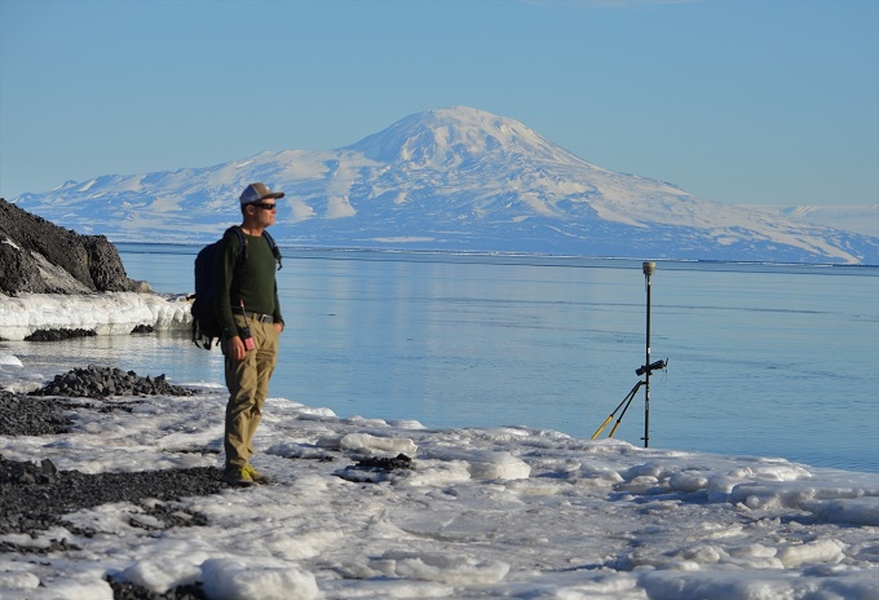
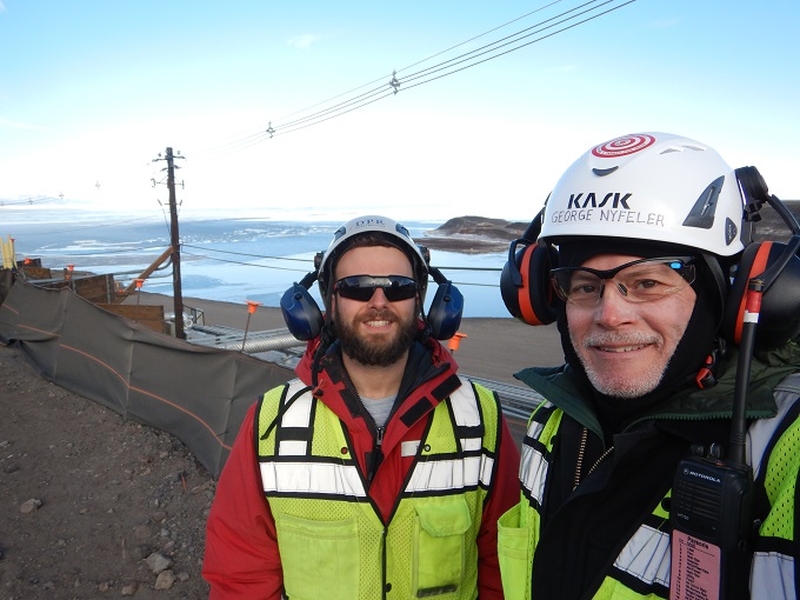
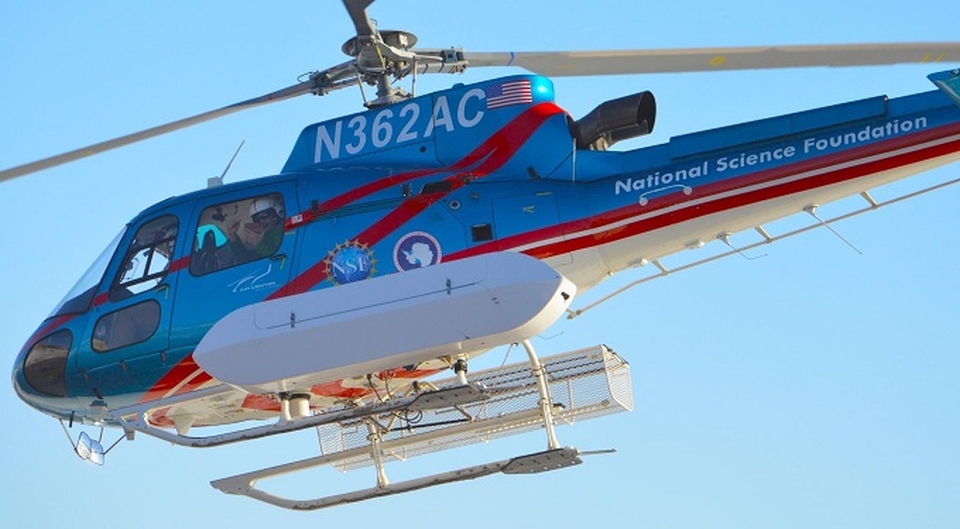
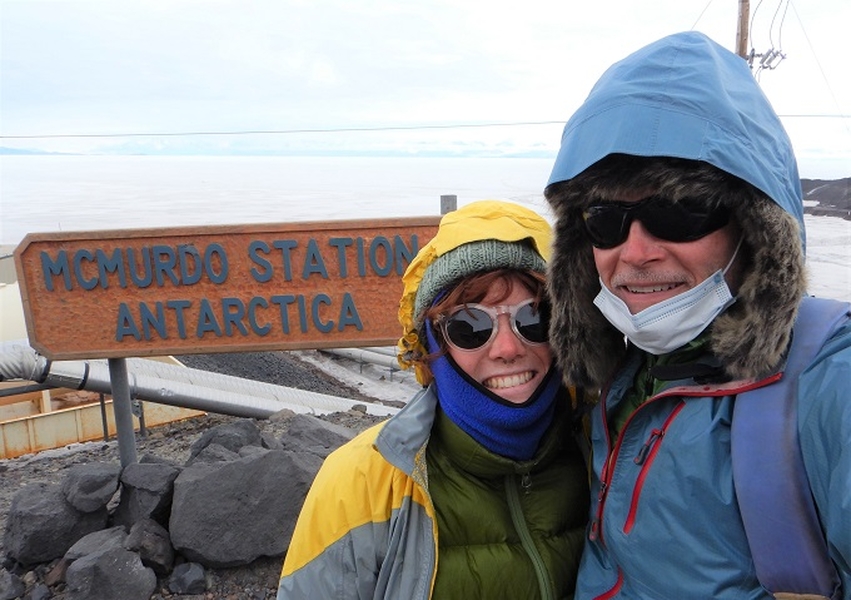
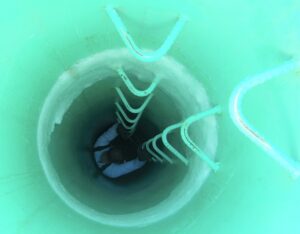
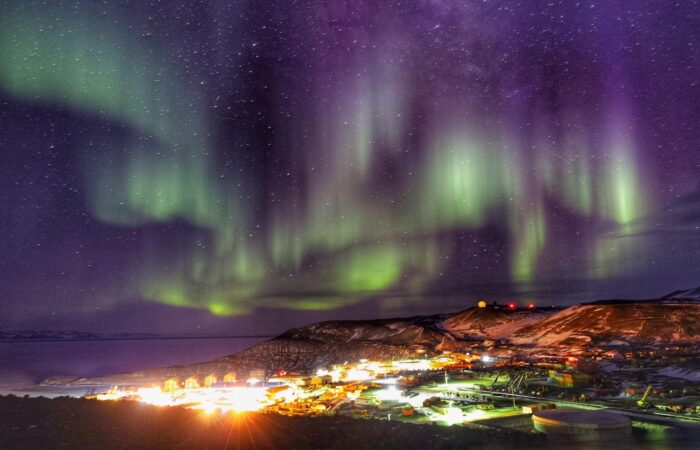
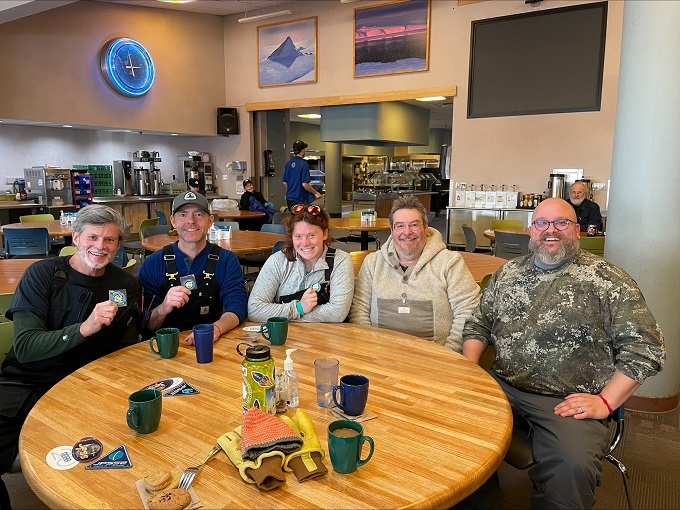
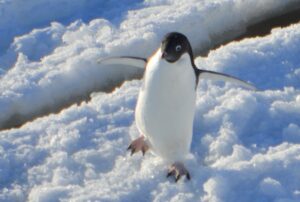
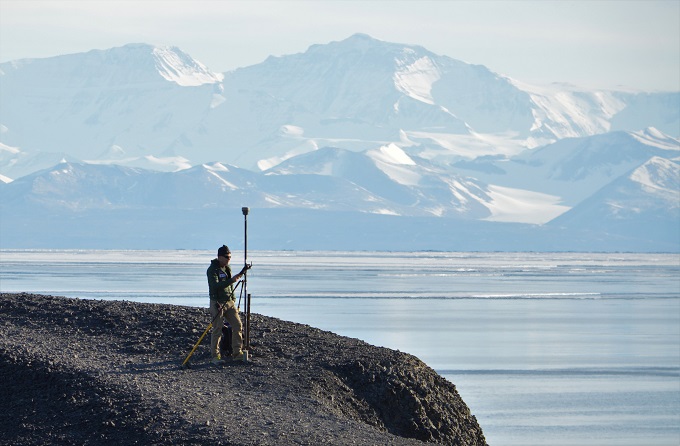


What an awesome article! Hope to see more like this in the coming years about our local businesses and some of the unique things they do.
Ditto. George used to be my work neighbor. How incredible that he’s landed this unique project.
I think it takes a very special kind of person to be able to live and work upside down for long periods of time.